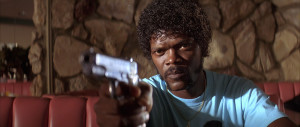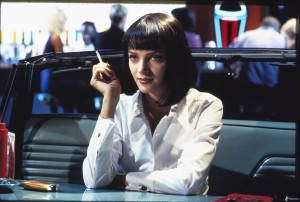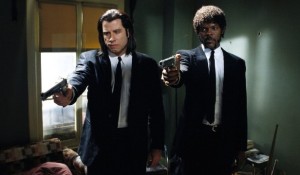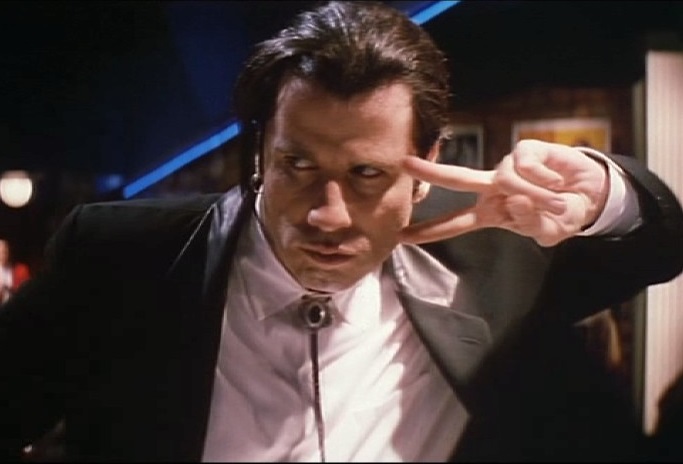Twenty years ago this October, cinema was changed forever – not only in writing style and presentation, but overall tone and texture. With the music world being over-run by alternative rock bands like Nirvana, Pearl Jam, and Alice in Chains, the release of “Pulp Fiction” would set the blueprint for a new style of movies and an alternative filming revolution – a style that would become a mainstay for the remainder of the decade. “Pulp Fiction” would hit America with the same ferocity as trendy flannel shirts and the comfort of leather couches in coffee shops. “Pulp Fiction” made it cool to be an Indy film.
Writer/director Quentin Tarantino made his movie debut in 1992 with the crime caper “Reservoir Dogs” While “Dogs” was really the first film to lay foundation into the alternative genre, its limited budget and marketability failed to make the global impact that “Pulp Fiction” did.
As a movie powerhouse, “Pulp” would get nominated for eight Academy Awards (with Tarantino winning for Best Original Screenplay) and help revitalize the career of its lead John Travolta.
It would serve as a propelling force to stardom for actors Samuel L. Jackson and Ving Rhames. The film would introduce us the the bizarre but intriguing Uma Thurman, and feature “Reservoir Dogs” alum Tim Roth and Harvey Keitel.

As if that weren’t enough, it also adds the talents of co-star Bruce Willis, and the great Christopher Walken in a cameo, though highly memorable role.
Keeping true to Tarantino form, “Pulp Fiction” is filled with highly gratuitous scenes displayed in a nonlinear order, and is packed with jabs at pop culture as well as a soundtrack that’s doubtless top ten all time.
 The film also demonstrates Tarantino’s incredible talents as a writer – with dialogue that’s perfectly real and scenes that flow like north Atlantic current.
The film also demonstrates Tarantino’s incredible talents as a writer – with dialogue that’s perfectly real and scenes that flow like north Atlantic current.
“Pulp Fiction” follows a handful of distinct, yet connected story lines: the travels of iconic hitmen Vincent Vega (Travolta) and Jules Winnfield (Jackson); A washed up boxer (Willis) that’s been paid to take a dive; Ruthless and mysterious crime boss Marsellus Wallace (Rhames) who seems to have full run of Los Angeles, and his spitfire of a wife Mia (Thurman).
Tarantino weaves the pieces together like a brittled old seamstress, taking individual parts that could each serve as a sub-movie in their own right, and tying them together into one cohesive piece.
Despite the bouts of intense and rampant action, the majority of the film is made up of its unforgettable dialogue.
 The players deliver quick and witty lines that are realistic and humanizing, despite utterance by their cartoonish characters.
The players deliver quick and witty lines that are realistic and humanizing, despite utterance by their cartoonish characters.
A discussion between Vincent and Jules about fast food in Europe opens the film, with the barbaric pair en route to a shakedown/assassination. The banter keeps the viewer completely engulfed while literally nothing else is happening. The lines are comical whilst the backdrop is anything but.
Tarantino has made a handful of great films, and the debate among fans as to which is truly the best is always a hot button issue.
My only real gripe with “Pulp Fiction” is its length. Though fast paced, its run time of 2:40 is a touch too long. Still, upon its release in October of 1994, “Pulp Fiction” was like nothing you had ever seen before. Two decades later, it is still an unforgettable and iconic movie.
by – Matt Christopher
A
So long to a friend…
I had planned to write the “Pulp Fiction” review in honor of the twenty year anniversary of its release, but the recent passing of a friend made me change my plans.
When I got my first “real job” in the summer of 2000, I was a young and (shockingly) awkward kid who stuck out in the cubicle lined aisles of corporate America like a bull in a ballet class. My first real friend was my “Team A” co-worker Bob Zane.
Bob was what I referred to as a cool adult. A guy who was a grown up on the outside but had the carefree personality of a wayward teen. We were work friends – going to lunch together on a daily basis and mocking management from the back row of nonsensical team meetings – but our friendship also transcended the borders of the office.
Bob introduced me to his favorite band, The Grateful Dead, who quickly became a favorite of mine. He got a cd burner on his computer, and a high speed modem (big things for 2001) and made me dozens of cds from lists of music that I gave him. We exchanged video games, and bantered about women.
My first apartment was two blocks over from Bob’s, and we carpooled to work for over a year. Bob helped me with my first ever fantasy football draft, and kept me laughing at work through plenty of rough times and stress.
We could talk music and TV, and argue sports all day. Bob was a Giants fan. I am an Eagles fan. That led to some memorable and constant trash talk.
Bob’s favorite movie of all time was “Pulp Fiction,” something I learned at the onset of a debate that started one day when I awarded “Reservoir Dogs” as the best ever Tarantino movie.
My stomach bottomed out this past weekend when I got the shocking word that Bob has passed away from a heart attack – exactly six years and one day after the last time I saw him. Bob wasn’t into texting or Facebook, so when I said goodbye before departing for South Carolina, it would be the last time we would ever talk.
I’ve now thought about him more in the past 72 hours than I had in the previous 72 months. His passing has made me appreciate how much he actually meant to me. Bob was one of those friends that, while only there for a brief portion of my life, I will always remember.
Today would have been his forty-fifth birthday, so I thought it a perfect time to post a review of his all time favorite movie.
Happy birthday Bob, you will never be forgotten.

